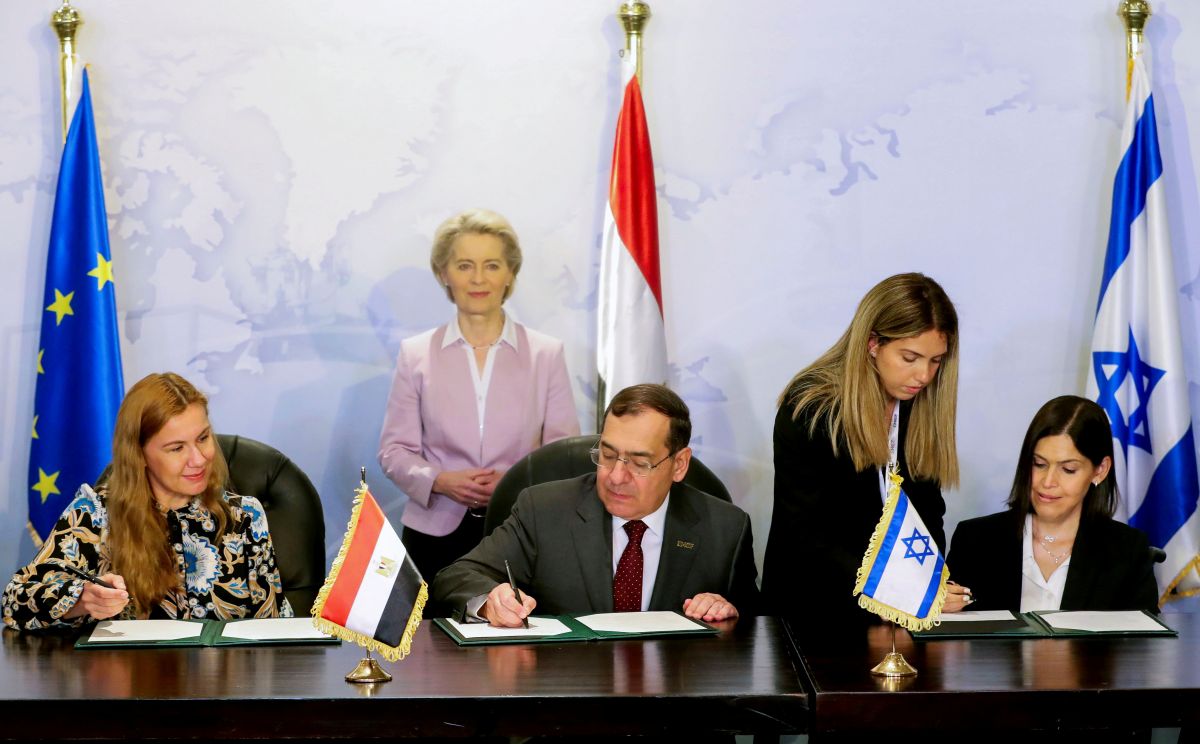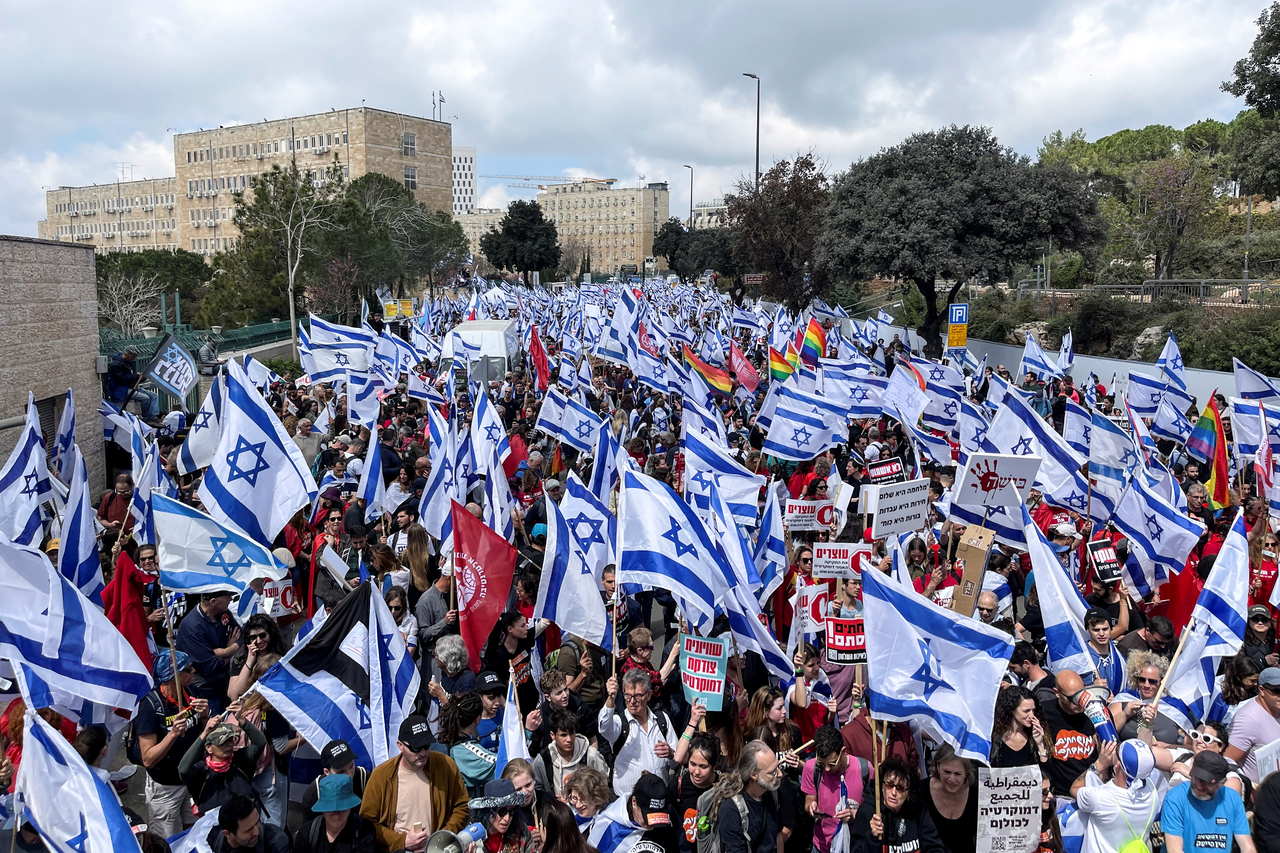The Kingdom's Dilemmas: Saudi Arabia Seeks Relationships with Both Israel and Palestine
Saudi Arabia is trying to find a new formula for its relations with Israel and the Palestinians. Although Saudi-Israeli relations are close on an unofficial level, the Israeli-Palestinian conflict, especially the position of Benjamin Netanyahu’s government, is holding back official normalisation. While the Saudis will seek to deepen relations with both Israel and the Palestinian side, this will be a process conditioned by, among other things, developments in Saudi relations with the U.S. and Iran.
.jpg) SAUDI PRESS AGENCY / Reuters / Forum
SAUDI PRESS AGENCY / Reuters / Forum
Saudi Arabia has adjusted its foreign policy towards the Middle East in recent years. A key element is its attempts to de-escalate the conflict with Iran, which resulted in the signing of an agreement in April this year with the participation of China. In May, the Arab League summit in Saudi Jeddah restored Syria’s membership of the organisation, de facto ending the regional isolation of the Bashar al-Assad regime. In the previous years, the diplomatic dispute with Qatar was extinguished, involvement in the Yemen peace process was increased, and Saudi-Turkish relations improved. While each process has its own bilateral considerations and was not always initiated by the Saudis (instead, often by the UAE), the common denominator is Saudi Arabia’s desire to stabilise the regional security situation. This is necessary to realise the country’s ambitious development vision, secure its leadership position among Arab states and attempt to reduce its dependence on the U.S. The actions taken towards Israel and Palestine are part of this strategy.
Policy Towards the Palestinians
The Saudi authorities have been actively involved in the Israeli-Palestinian conflict, including from a position of leader in the Sunni Islamic world. They have spearheaded mediation and peace plans, the most notable of which was the 2002 Arab Peace Initiative, which envisaged Arab recognition of Israel following its withdrawal from the occupied territories and creating an independent Palestine. The Saudi authorities were also involved in the reconciliation process between Fatah and Hamas, but the Mecca agreement reached in 2007 was not implemented. Relations with Palestinian groups have weakened over time. In the case of Hamas, this had to do with its links with the Muslim Brotherhood, considered a threat by the Saudis and listed as a terrorist organisation in 2014. As a result, there have been arrests in Saudi Arabia of Hamas members (e.g., in 2019). Saudi Arabia has also reduced its support for the Palestinian Authority (PA), resulting from a loss of confidence in the Fatah authorities and, simultaneously, part of building close relations with the U.S. during the Trump administration. Relations with the Palestinians are also part of the political rivalry with other states in the region (the UAE in the context of the PA, Qatar, and Iran in the context of Hamas). However, Saudi tools of influence are more limited than, for example, Egyptian or Jordanian ones.
In recent months, the Saudis have improved relations with both Fatah and Hamas, including restoring some funding to PA. In April, Palestinian President Mahmoud Abbas and a Hamas delegation led by political bureau chief Ismail Haniya visited Saudi Arabia. The Saudi authorities released some Hamas-linked prisoners and condemned recent Israeli actions in the Palestinian territories.
Israeli Context
Saudi Arabia has been one of the countries in the region with which Israel has strengthened covert cooperation for more than a decade, primarily due to a converging perception of the Iranian threat. Currently, the driving force behind the development of these relations on the Saudi side is Crown Prince Mohammed bin Salman, who, according to media reports, has allegedly met personally with Netanyahu on several occasions. The intelligence services maintain close cooperation. Saudi Arabia has also obtained—usually through intermediaries—some Israeli security technologies, including digital surveillance tools and solutions used in economic reforms (e.g., renewable energy). The tone of the message in the public debate on Israel (including in school curricula) has also softened, and contacts are being developed, for example, in sports or interreligious dialogue. Saudi Arabia has also vested interest in the situation in Jerusalem where the Israeli authorities were to negotiate to allow Saudi participation in the custodianship of the Temple Mount. In 2022, Saudi Arabia opened its airspace available for flights to Israel. At the same time, the Saudi authorities have not agreed to launch direct flights for Muslim citizens of Israel going to the Hajj, which was proposed this year.
A Game of Normalisation
Official recognition of Israel by Saudi Arabia is one of the main objectives in the foreign policy of the Israeli authorities—it was one of Netanyahu’s most important election promises. The attitude of the Saudi authorities towards the Israeli-Arab normalisation process is favourable, as evidenced, for example, by the recognition of Israel by the Bahraini authorities. However, establishing official relations, a step of great political and symbolic significance, remains subject to several conditions. The fundamental challenge remains the Palestinian question. This concerns the situation in the West Bank where, according to UN figures, some 147 Palestinians have been killed (around 4,300 injured) since the beginning of the year till mid-May, mainly as a result of clashes with the Israeli army, while on the Israeli side, 23 deaths (around 110 injured) have been recorded in attacks by Palestinians. The situation is further complicated by the most extensive Jewish settlement expansion plans in years and the rhetoric of the Israeli authorities. The long-term problem is the lack of political space to discuss a two-state solution. The Saudis insist (as they did, for example, with Trump's plan) that normalisation is impossible without concessions on the Israeli side. The rigidity of the Saudi position stems from divisions within the country’s political elite. While King Salman traditionally supports the Palestinians, the heir to the throne is not so committed to the Palestinian issue. Those in favour of normalisation with Israel may also fear public resistance. Another factor is Saudi Arabia’s ongoing efforts to de-escalate the conflict with Iran. If the Saudis were to engage overtly with Israel, without working out major concessions in favour of the Palestinians, it could undermine this policy, given Iran’s anticipated fierce opposition.
In addition to the parties themselves, the U.S. plays a crucial role in potential normalisation. The Democratic administration strongly supports the process, and success would be used by President Joe Biden in next year’s U.S. elections. Normalisation is also hampered, though, by discrepancies in U.S. relations with the parties regarding the Saudis’ attitude towards Russian aggression against Ukraine or the internal situation in Israel. The Saudi authorities have submitted specific political demands—currently the subject of diplomatic talks—to the U.S. for normalisation, including security guarantees, the purchase of advanced weaponry (including the advanced F-35) and assistance in developing a civilian nuclear programme. The latter two elements raise concerns on Israel’s side as reducing its military advantage in the region and increasing the chances of Saudi Arabia acquiring a nuclear capability.
Perspectives
Saudi Arabia drive to stabilise its international environment necessitates addressing both the Israeli-Palestinian conflict—an issue still of great political and image importance—and Israeli-Arab normalisation. Despite the mutual benefits of past cooperation, the attractiveness of Israel’s technological offer, and the changes introduced by Saudi Arabia, normalisation with Israel at the current juncture is too problematic for the Saudis, especially with the U.S. getting into Saudi terms. The Saudis’ rapprochement with Iran generates another divergence, although Israeli politicians are trying to diminish the significance of the recent Saudi-Iranian agreement. A space for deepening cooperation from a Saudi perspective could be created by adopting an updated version of the Arab Peace Initiative. Still, there is little chance that Netanyahu will push through such a decision with the current composition of the government, even assuming it would be a purely political declaration. Hence, the parties may seek a minimalist formula for developing open cooperation within multilateral initiatives’ framework, such as climate protection.
The space for new political action also depends on the forthcoming succession of authorities in Saudi Arabia and the PA. While Mohammed Bin Salman’s assumption of power increases the chance of closer relations with Israel, it does not mean automatic normalisation or reduction of support for Palestine. The Saudi authorities may take advantage of the cabinet reshuffle in the event of President Abbas’ departure, including by providing financial support to specific groups bypassing official PA structures or attempting to mediate between Fatah and Hamas. Without Saudi involvement, further development of relations between Israel and the Gulf states, such as the considered economic and infrastructure projects, will be hampered.




